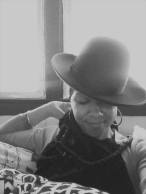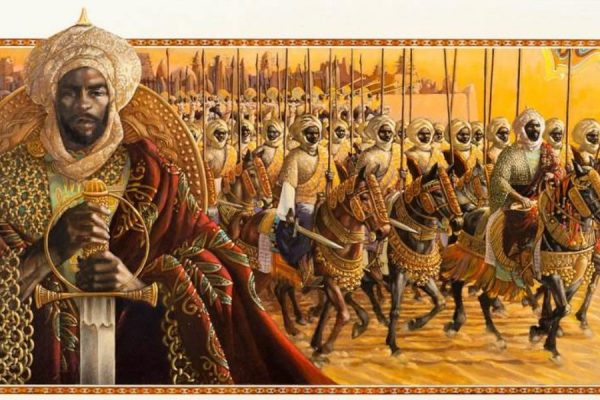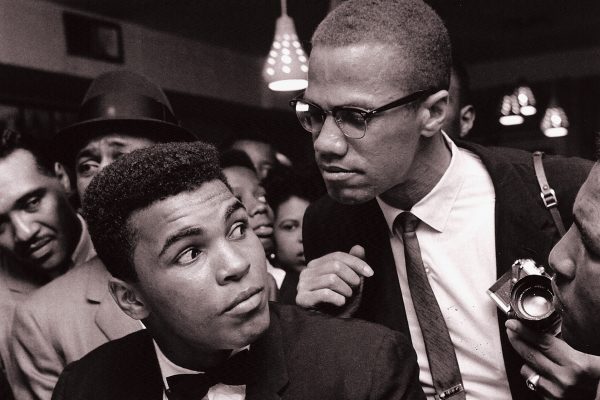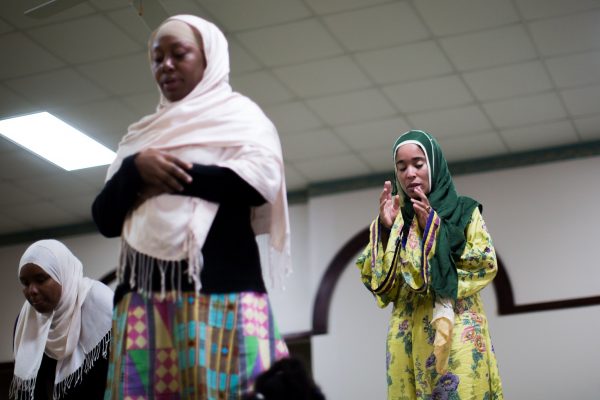Even though there is great value in being able to motivate yourself, to be a self-starter, there is nothing that can replace having a community.
Even though there is great value in being able to motivate yourself, to be a self-starter, there is nothing that can replace having a community.
As the American Ummah continues to unpack the intersections of identity, otherness, and faith, it seems fitting to bring back Aisha Sharif’s interview and poem “To Muslims Who Do Not Say, Salaam.”
– – –
To Muslims Who Do Not Say, Salaam
All your life, you’ve tried to muffle the sound
of your father trumpeting the adhan
in your ear every day, five times a day.
You’ve hung your mother in the closet
of your mind, ashamed of her habit. Yet, a hijabi
walking toward you raises your dead,
and you must look away. You’ve whitewashed
your name, turned Abdullah to Abe, Suhaylah to Haley.
But here is faith, that security checkpoint
you thought you had already passed.
Will it set off the prayers resting in your palms,
the Arabic on your tongue? You look away
and do not say, Peace. Because how can you wish
for your sister what you do not have yourself?
– – –
Aisha Sharif: Brief Biography
I’m originally from Memphis Tennessee; my Father is from Memphis, he grew up there, and my Mom is from St. Louis, Missouri. Like a lot of African Americans, they converted, well my father converted [to Islam] in the 80’s and my mom converted shortly thereafter. My Mom was Catholic, and my Dad was Episcopal. All of my brothers and sisters were raised Muslim.
I went to Sister Clara Muhammad School from grades third through sixth, and that really helped shape my Muslim identity. After that I went to public school, I think that was around the time I started to write poems. I always approached writing as a cathartic experience; writing through a situation to reveal thoughts that perhaps I would never engage. It wasn’t until graduate school that I started writing poems about being African American and Muslim, and dealing with that identity. Once I got to grad school, I had a bigger pool of Muslims that I was communicating with, but they were Arab and Turkish. That made me more conscious of being African American.
Q&A on her inspiration
Sapelo Square: After graduate school is when you participated in the Cave Canem fellowship?
AS: I found out about Cave Canem when I was in graduate school pursuing my MFA in poetry. When I graduated, I went out and taught high school for a few years, I didn’t write much at all and I needed to get back into the writing game. I just needed to have that connection with other poets, especially African American poets. I have met so many different writers, and I have learned a lot about myself as a writer and my craft too.
Sapelo Square: There was a time in this country when it was illegal for African Americans to read and write. Do you feel that there is a need for more communal support to feel confident and empowered to keep writing?
AS: I would definitely say, yes. During the time I was in St. Louis, I didn’t have a writing community at all, I was on my own, and I wasn’t writing. Even though there is great value in being able to motivate yourself, to be a self-starter, there is nothing that can replace having a community. Being a writer involves being aware of the audience. If you don’t have an audience looking at your work on a regular basis whatever regular is: whether it’s once a week, twice a month, once a month; then I think you don’t get the full aspect of how your work can be strengthened and challenged. So once I started going to Cave Canem, I started to push my writing more because I had people who essentially would call me out on certain moves that I was making that were too safe in my poems.
Sapelo Square: You mentioned the audience. We were introduced to your work through Rattle. Would you rather speak to a group of people that have no connection to your experience, so you can educate them or do you want to write for the people in the community you grew up in?
AS: That’s such a good question. I think initially I was writing for my academic peers because, in graduate school, that was the audience for my poetry. I just thought, maybe I’m going to be the person that introduces the African American Muslim life to these people. They seemed really interested and enjoyed reading my work. So, I didn’t give that a second thought. Soon after I started to rethink my audience, maybe my work needed to be shared with the people around whom I’ve grown up. The poem in Rattle, “Why I Can Dance Down A Soul-Train Line In Public And Still Be Muslim”, is a very different type of poem. I wouldn’t say that it’s not representative of my work because it is, but I also write a lot of form poems.
I’m realizing, that there is so much diversity within a community, and as much as we are connected by religion, we all have different experiences. I would love to have Muslims be open more to talk about stuff that is uncomfortable. I feel that there is such a stigma, like a taboo about sex, marriage, therapy, which are all the things I talk about in my next book. I would love for this book to be a conversation starter for Muslim women because, I know I’m not the only one that has thought about certain questions about going without hijab, even though I’ve worn hijab my whole life, those types of questions, and not wanting the stock answers either.
Aisha Sharif’s poetic manuscript “To Keep From Undressing”, was recently selected by Spark Wheel Press, for a winter 2018/2019 release. Spark Wheel produces five books of exceptional poetry per year. Congrats Aisha!
 Aisha Sharif is a Cave Canem fellow who resides in Shawnee, Kansas, a suburb that borders Kansas City, Missouri. And in many ways, much of her poetry and nonfiction addresses the politics of “bordering identities.” As an African American Muslim woman, her work explores how racial, gender and religious identities align, separate, and blend. Her poem, “Why I Can Dance Down a Soul Train Line…” was nominated for a Pushcart Prize in 2015. Aisha’s poetry has also appeared in journals like Rattle, Callaloo, Crab Orchard Review, and Calyx. She currently teaches English at Metropolitan Community College in Kansas City, Missouri.
Aisha Sharif is a Cave Canem fellow who resides in Shawnee, Kansas, a suburb that borders Kansas City, Missouri. And in many ways, much of her poetry and nonfiction addresses the politics of “bordering identities.” As an African American Muslim woman, her work explores how racial, gender and religious identities align, separate, and blend. Her poem, “Why I Can Dance Down a Soul Train Line…” was nominated for a Pushcart Prize in 2015. Aisha’s poetry has also appeared in journals like Rattle, Callaloo, Crab Orchard Review, and Calyx. She currently teaches English at Metropolitan Community College in Kansas City, Missouri.
 Aïdah Aliyah Rasheed is an interdisciplinary artist and multi-media producer. She has worked with world-renowned artists, museums, and educational institutions. Additionally, she carries more than a decade of civic engagement and interfaith service, creating innovative solutions to the economic and racial injustices facing communities around the United States. Rasheed holds an MFA from the California College of the Arts and a BFA from Morgan State University.
Aïdah Aliyah Rasheed is an interdisciplinary artist and multi-media producer. She has worked with world-renowned artists, museums, and educational institutions. Additionally, she carries more than a decade of civic engagement and interfaith service, creating innovative solutions to the economic and racial injustices facing communities around the United States. Rasheed holds an MFA from the California College of the Arts and a BFA from Morgan State University.





